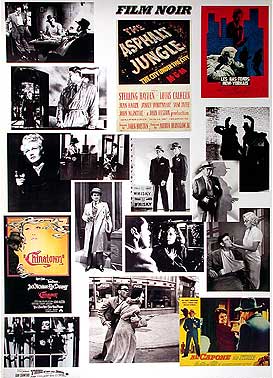 I Was working late in my D.C. office. I'd been running some new simulations on my macro-model, but nothing was converging, so I figured I'd close up my spreadsheet and find a corner in some dark speak-easy to lick my wounds.
I Was working late in my D.C. office. I'd been running some new simulations on my macro-model, but nothing was converging, so I figured I'd close up my spreadsheet and find a corner in some dark speak-easy to lick my wounds.That's when she walked in. She had a neckline as low as the Nasdaq in '01, curves like sine waves and a dress tighter than the global oil supply. She had my attention even before she pulled out two reports I'd seen that very morning.
"I'm sorry to barge in on you like this," she said in a voice that gave my calculator a power surge. "I didn't know where else to turn."
"You came to the right place, doll," I said. "I see you've got the first-quarter GDP report, along with the new compensation results." I'd been puzzling over these numbers all day, but what, I wondered, could this tall glass of ice water want with them?
"That's right," she purred. "I need to know why GDP is up 4.8%, the strongest quarter since 2003, yet real wages are falling." Yeah, I thought, you and everybody else who works for a living.
"Why the interest?" I shot back. She didn't look like a Democrat.
"I wish I could tell you. But I work for some powerful people" — now I knew she wasn't a Democrat — "and they'd be very upset if they even knew I was here."
"Why me? Why don't you ask your powerful friends to explain why the economy's racing ahead but leaving working stiffs behind?"
She got kinda sulky, and I kinda liked it. "They wouldn't know where to look. What's worse, most of them think it's great when wage growth decelerates because with no inflationary pressure from labor costs, it means the Fed can take a powder on rate increases."
"Tell me about it, sister. I've been leaning on Bernanke for months on that point, but he doesn't return my calls."
Needless to say, I took the case. I wasn't sure what game little Miss Conflicting Reports was playing, but I figured I'd play along for now.
Fact is, I'd been asking the same question myself. Every quarter we seemed to be getting great news on top-line statistics — GDP, productivity, profits — yet the typical workers' real earnings were down 2% over the recovery. Guys like me don't like it when things line up that way.
I headed for the union hall, figuring some of those guys might have an angle. Problem was, with private-sector unions down to 8% of the workforce, the hall had become a Starbucks. I got a vanilla chai latte to go and beat it.
I decided to head for the new economy, so I looked up some managers and professionals in the service sector. I found them, all right, but they didn't have any answers. As of the first quarter of 2006, their compensation had lagged inflation for three quarters running.
This was more serious than I'd thought. Whatever was driving a wedge between overall growth and living standards, it was reaching pretty high up the pay scale. I wasn't sure what mess I'd gotten into here, but it was time to confront the doll that got me into it.
I caught up with her in her penthouse, a place that had "housing bubble" written all over it. I know my wealth distributions, and this kitten came from the top 0.1%. I don't like playing the sap — it was time for some class warfare.
"OK, gorgeous. Drop the 'two Americas' line and give it to me straight. You know as well as I do where the growth is going. What's your game?"
She nibbled her lip and looked up at me real sweet. "I suppose if I told you I'm just a girl who cares about the bottom 99%, you wouldn't believe me."
She supposed right.
"All right, I'll come clean," she said, slumping in a chaise lounge that probably cost the average income of the bottom fifth. "I work for the Republican National Committee, and we're starting to get spooked by the president's poll numbers on the economy. We figured if we don't get a little trickle-down soon, it could hurt us in 2006, not to mention '08."
I kicked myself for not seeing it sooner. "So you don't give a damn about the structural factors driving the productivity/wage gap: the declining unions, low minimum wage, the profit squeeze, slack job creation and, most of all, the way globalization is sapping the bargaining clout of the American worker, blue and white collar alike."
"Why should I?" she said, finally showing her true colors. "Any intervention would just cuff the invisible hand, doing more harm than good." She was Milton Friedman with the body of Scarlett Johansson. I had to get outta there.
"You're wrong," I shouted, staggering toward the door. "You can't see it, but these two reports are a microcosm of everything that's right and wrong with this economy. Tell your people that whoever understands and articulates this disconnect, along with a convincing policy agenda to reconnect growth and living standards — that's who wins the big tamale."
I was wasting my breath. She had me bounced by a security guard as pumped-up as ExxonMobil's profits.
I brushed off the dust and headed for the office. You'd think a case like this would be dispiriting to a guy like me, but you'd be wrong. Sure, she made me mad, but I saw things clearly now, and her little scheme was about to backfire.
There's an electorate out there that's looking for some economic stewardship. Maybe I'm just one economist in this big, crazy city, and maybe the other guys got the deep pockets. But the way I see it, we can shape our economic outcomes so that everyone gets a fair shake, not just the chosen few. I opened up a spreadsheet and got to work.
(written by Jared Bernstein, a senior economist at the Economic Policy Institute)

No comments:
Post a Comment